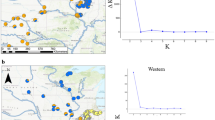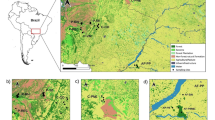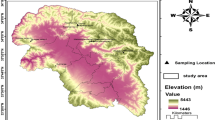Abstract
The random amplified polymorphic DNA (RAPD) technique was used to evaluate genetic affinities among eight red mullet (Mullus barbatus L., 1758) samples from the Mediterranean Sea. Twenty-nine random primers were used. Despite the variability which was found within samples, no specific RAPD marker for the discrimination of the populations was detected. The data analysis revealed that the genetic diversity among populations is positively related to their geographic distances. The results of this study indicate that the estimated intraspecific variation may be more␣pronounced with RAPD markers than with allozymes when the two approaches are applied on the same populations.
Similar content being viewed by others
Author information
Authors and Affiliations
Additional information
Received: 7 November 1997 / Accepted: 30 May 1998
Rights and permissions
About this article
Cite this article
Mamuris, Z., Apostolidis, A., Theodorou, A. et al. Application of random amplified polymorphic DNA (RAPD) markers to evaluate intraspecific genetic variation in red mullet (Mullus barbatus). Marine Biology 132, 171–178 (1998). https://doi.org/10.1007/s002270050383
Issue Date:
DOI: https://doi.org/10.1007/s002270050383




